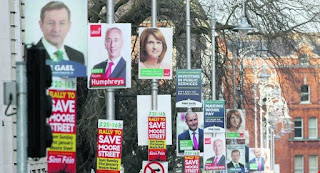 |
| From the Irish Examiner |
The Irish nation doesn’t do thinking in generalities. Whether that’s the media’s fault or the politicians’ fault is a chicken-and-egg situation – we would have a higher level of political debate if the media would report it, politicians would frame issues in a different way if they thought the media would report it that way. Who knows?
The only thing we do know is that one leader saying that, if elected, he or she will hire 500 new guards, and the next seeing the five hundred guards and raising 300 teachers, is rubbish. Rubbish. Here are the questions that should be asked during tomorrow night’s leaders’ debate, but won’t.
The Economy
As an open economy that does not control its own currency, what would different parties do to exert control on the economy? If inflation is rising, for instance, a government will usually raise interest rates to make it harder to borrow. This lessons the money in the economy and means that prices don’t go up quite as high.
But if inflation is rising in Ireland but flat in the Eurozone, that’s not an option for Ireland. One of the reasons the crash happened was that interest rates were too low relative to the money available, and this created a bubble. What has the current government done to protect the state from that happening again, or from recession in China? What will an alternative government do to protect the state from those and other external economic threats?
The Electoral System Itself
Irish politics is engineered to favour clientelism at every step. To survive, a TD must put local interest ahead of the national interest, even though TDs are elected to govern the nation, not the local area. This is partly why it will be so very difficult to form a government after this election. What steps has the current government taken to address this systemic failure? What steps will the alternative governments take to address this issue?
Education
One of the reasons for Ireland’s current economic prosperity is that the reputation of Ireland’s workforce as being well-educated is very good. But grade inflation has become more and more obvious in STEM subjects at secondary level, and it’s only a matter of time before the tech firms realise the educational system isn’t quite as advertised. What steps has the current government taken to address this issue? What steps will the alternative governments take?
The Distribution of the Recovery
Although elected to govern for the entire state, and by aspiration the entire island, successive governments have favoured the development of Dublin at the expense of the rest of country. A spatial developmental strategy was proposed as far back as 1969, yet nothing has been done about this issue. There are number of reasons for this, bribery, corruption and plain stupidity among them. What steps has the current government taken to address this issue? What steps will the alternative governments take?
Health
Hard case stories are terrible, but governments have to look at big pictures. When it comes to patients on trollies, there are questions not being asked. Are patients on trollies localized – do some hospitals regularly have more patients on trollies than others? Which ones? Why? Are patients on trollies seasonal – are there more patients on trollies in winter than in summer? On Saturdays rather than Wednesdays? This isn’t a medical issue. A medical issue is finding a cure for cancer. The vast majority of issues in the health service come down to poor management. What steps has the current government taken to address this issue? What steps will the alternative governments take?
Crime
We have a Special Criminal Court in this state. We have abolished trial by jury in certain circumstances, an extraordinarily totalitarian situation about which the normally vocal liberal lobby are strangely quiet. Why not use these extraordinary powers to break up Irish gangland, rather than seeing them being glamorized in the gutter press and in TV dramas? What is the Government’s position on this? What are the alternative governments’ positions?
Media Ownership
There can be no real democracy without a free press. A free press keeps the people informed on what their leaders are doing. Without a free press, how can the people know how they’re being governed. Recent technological and business changes have turned the Irish media landscape on its head, to the extent that whether or not a free and independent indigenous media is now under question. What is the Government’s position on this? What are the alternative governments’ positions?





